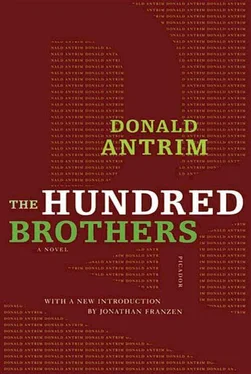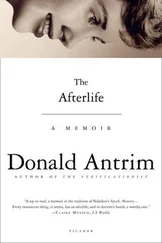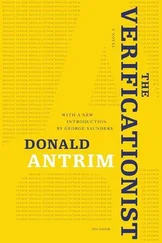It is true that we have all seen one another undressed at one time or another, and the range of our sizes is, I can report, exactly as you might suspect. What can be said about a hundred penises of all ages? Clay had a pocketed hand wrapped around his. Gently, absently, through the pocket’s cozy inner lining, Clay kept himself hard.
“Doug, I think I need some air,” Virgil whispered, very quietly even for Virgil. He was watching the floor. Needle fear had made him sweaty.
“Right. Good idea,” whispering back in that hush of the library fraught with expectancy and tension, tugging on his arm. “Come on. I’ll help you.”
“I’m all right. Let go of my arm,” Virgil insisted.
“I don’t mind. You stand up and I’ll help. We’ll slip out to the gazebo and relax on a bench and watch the homeless people light their campfires in the meadow.”
“Doug, you’re hurting my arm. Please! I don’t want to go to the gazebo.”
A scattering of brothers swiveled heads to frown in our direction. One of these — it was Roger in his cowboy boots — waved. Neither Virgil (hunched uneasily over, palms clammy on knees) nor I (hands securely affixed to Virgil’s forearm) dared wave back. If you show Roger indication of receptivity to him, he’ll come over.
To Virgil I said, “You’re making a spectacle.”
“I’m sorry.”
“If I let go of your arm, will you pull yourself together and behave?”
“Yes.”
“I don’t want you running off. All right? I don’t want to have to come hunting for you.”
Gloominess from Virgil. Dead animals gazed down. Among the men gathered around Maxwell, a solemn, ethnomedical colloquium was in progress. Certain words—“rapture,” “zombie,” “potential blindness”—and longer phrases—“extensive psychomotor damage” and “Indigenous peoples along the lower Amazon use these substances in spirit rituals” and “Actually, in some cases, humans ”—escaped, now and then, to rise up and echo dully against the bleak vaults above our heads. Finally from out of this ad hoc conference there came a wail, loud at first and growing louder like some animal’s sound. Every brother turned. The Doberman, hearing the sound, bounded from his place leashed to the armchair and made his own racket tugging things over. No one paid any attention to this. The wail rang out. It was coming from Max. Brothers closest to the sound did not know whether to approach or retreat as, first, Max’s hands, then his feet, next arms, and at last Maxwell’s legs began to tremble and to flail, all extremities storming the air near Milton and Siegfried and our young Christopher. Backward these three now fled. There was no holding their brother. Violently Max beat the air. Only Barry persisted — dutifully — in trying to comfort Maxwell’s sputtering head in his lap. “A tongue depressor! Hurry! In my valise!” cried the MD, but it was too late for this as Maxwell’s open hand swung furiously upward to slap Barry’s face and knock eyeglasses flying and the doctor himself tumbling backward against a table leg that stove him in the head. “Uhf,” Barry said. Then Fielding’s camera’s battery-powered spotlight bleached everything white, as Fielding climbed more or less aboard Max, shot down on the pharmacobotanist, took blows in the process. Fielding’s commitment to his craft was inspiring. Nevertheless, there was something garish about this scene. The documentary-film maker’s art is not only voyeuristic (we are, after all, meddlers in one another’s lives), but opportunistic — our poor Max suffering epiphanies on the rug and his own brother satisfied to hover above him and film it! Maxwell punched deliriously at nothing we could know. The noise rising from him was magnificent. It was a sound you might imagine coming out of a man being opened with a knife. It hurt to hear it. Virgil, hearing it, got that terrorized look he gets, eyes showing white, not a good sign, and I thought it’d likely be advantageous under these circumstances to go ahead and squire him around back for some air, so said to him, “Let’s go, Virgil.” Unfortunately leaving became immediately unfeasible. Max’s long scream, nearing its end, turned articulate. From the Persian carpet at the heart of the room, Maxwell, breathless and bloodlessly pale beneath Fielding’s camera shining down on him in his distress, cried, “Doug! Doug!”
And was quiet again.
Hands twitched a little. Chest rose and fell. One foot kicked its mate.
For a moment no one seemed ready to make a move. Men near Max watched him. A few raised eyebrows, nodded my way; whispers were passed. Barry clutched his head — the doctor seemed disoriented. Kevin in a low voice said, “Here you go, Barry,” and handed Barry his glasses, which had landed unharmed over by General Non-fiction C — E.
And I could hear other sounds in the room. Max’s hard breaths, and the creaking made by old floorboards underfoot as, one after another, brothers shuffled to left or right, little by little opening a path between the love seat and the place where Max lay bathed in light and sweat.
Fielding did not miss a beat. He whirled his camera to shoot up this impromptu corridor of many brothers fanning backward to make way for — for what? Virgil raised hands to shield eyes from the high-wattage brightness suddenly pouring in on us. For my part, I hate appearing in Fielding’s motion pictures, no matter the occasion. There always comes a time when we have to sit around on folding chairs and watch the things, and someone always has to pop corn, and Fielding always has to solicit comments on the effectiveness of his work, and this is not enjoyable; it’s rude.
Now Fielding was motioning to us — to me, actually — with his free hand, making a directorial “steady now, walk toward the camera” gesture.
“Shall we?” I said to Virgil.
“You go. Max wants you.”
“I’d appreciate it if you came with me.”
“Do I have to?”
“No. It’s up to you. I’m inviting you to join me, if you’d care to.”
“What do you think he meant when he said, ‘The God is within us’?”
“He said, ‘The God is among us.’”
“‘Among us’?”
“I believe that’s what Max said. We’ll have to ask him, won’t we? Let’s find out how Max is feeling, then we’ll sit somewhere quiet.”
“Can we get something to drink?” Virgil asked.
“You bet.”
“Because I’m very thirsty, Doug.”
Getting up from the love seat was difficult. Virgil had trouble. It was a matter of leverage. The love seat was low and our knees were high. We made a false start in which Virgil dug his fist into my ribs as I tried pushing until something hurt in my back and Virgil foundered. Light from Fielding’s handheld camera flashed around us; the light threw colossal human shadows, the shadows of brothers, onto far walls. Larry stepped directly into the camera’s sights; his enlarged likeness spanned shelves and windows almost to molding level. Daniel’s likeness flickered hugely across the room, a monster en route to the door where, at that moment, Albert entered, as the blind will, tapping, with his retractable cane, a route among the furniture legs. “Good evening, gentlemen,” Albert said without moving his head. Fielding rotated the camera to follow Daniel steering Albert carefully past Max, and toward his, Albert’s, usual chair beneath the caribou heads with ears missing.
Fielding’s light fell on Virgil and me again, and this was nauseating because we could not manage to rise from the love seat; it was hopeless, everybody staring at Virgil climbing across my lap.
“Don’t.”
“Stop.”
“Wait.”
“Stop.”
“Don’t.”
“Wait.”
Читать дальше












